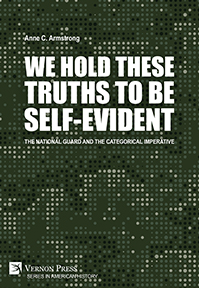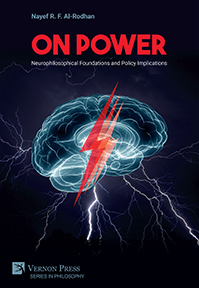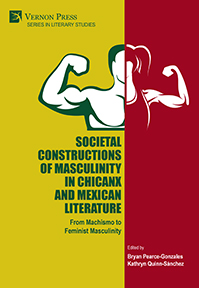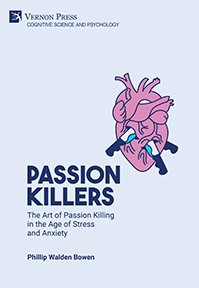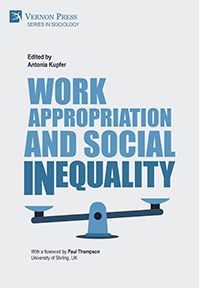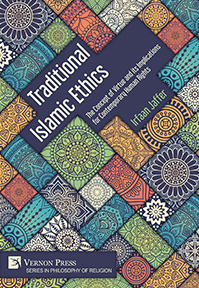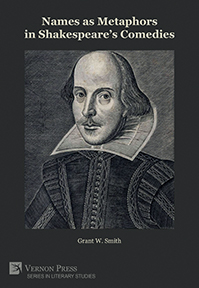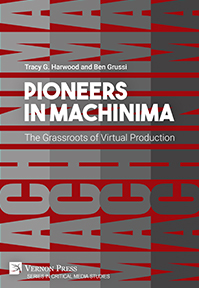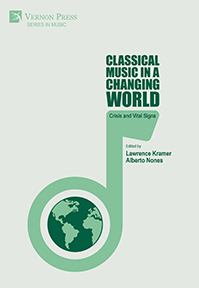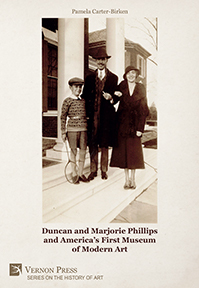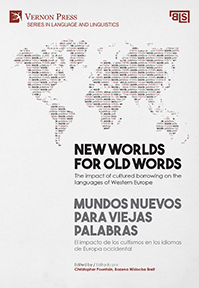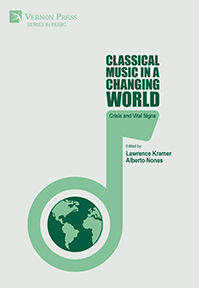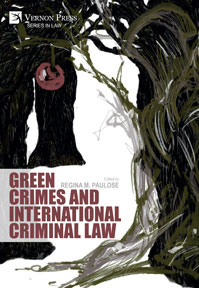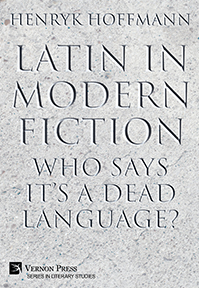Search
Browse
by Publication status
by Subject
Anthropology (28) Art (126) Business and Finance (27) Cognitive Science and Psychology (56) Communication and Journalism (49) Economics (63) Education (70) History (150) Human Geography (22) Interdisciplinary (43) Language and Linguistics (140) Law (16) Music Studies (19) Philosophy (162) Political Science and International Relations (105) Sociology (324) Statistics and Quantitative Methods (21)by Series
Series in Literary Studies (72) Series in Philosophy (59) Series in Education (55) Series in Sociology (46) Bridging Languages and Scholarship (33) Series in Politics (33) Series in World History (32) Series in Language and Linguistics (25) Series in Philosophy of Religion (22) Cognitive Science and Psychology (21) Series in American History (20) Critical Perspectives on Social Science (19) Series in Art (19) Series in Cinema and Culture (16) Series in Critical Media Studies (16) Curating and Interpreting Culture (15) Series in Anthropology (14) Series on the History of Art (14) Economics (14) Series in Business and Finance (13) Series in Music (12) Series in Communication (10) Series in Performing Arts (9) Philosophy of Personalism (8) Series in Law (8) Series on Climate Change and Society (8) Series in Economic Methodology (7) Women's Studies (7) Classics in Economics (6) Series in Economic Development (6) Philosophy of Forgiveness (5) Series in Built Environment (5) Series in Economic History (5) Series in Philosophy of Science (5) Series in Social Equality and Justice (5) Series on the History of Science (4) Serie En Estudios Literarios (3) Serie en Sociología (3) Series in Contemporary History (3) Series in Creative Writing Studies (3) Series in Design (3) The Interdisciplinary Built Environment (3) Serie en Comunicación y Medios (2) Serie en Historia (2) Serie en Música (2) Series in Heritage Studies (2) Series in Innovation Studies (2) Series in Philosophy of Race (2) Serie en Ciencias Políticas (1) Serie en Entorno Construido (1) Serie en Estudios Culturales (1) Serie en Filosofía (1) Serie en Filosofía de la Ciencia (1) Serie sobre Cambio Climático y Sociedad (1) Series in Classical Studies (1) Series in Economics of Technological Change (1) Series in Urban Studies (1)by Language
English Spanishby Author
We Hold These Truths to Be Self-Evident: The National Guard and the Categorical Imperative
Anne C. Armstrong, National Guard Educational Foundation; National Guard Memorial Museum, Library, and Archive
Availability: In stock
158pp. ¦ $44 £33 €38
In this monograph, Dr. Armstrong argues that a nation founded in Enlightenment theory can rely on Kant’s categorical imperative as a rationale for voluntary service in one’s local National Guard. Since the 19th century, a Utilitarian argument has been the favored rationale, but in We Hold These Truths to be Self-Evident: The National Guard and the Categorical Imperative Dr. Armstrong contends that there is also a normative rationale. The author traces Guard history from its inception in 1636 to the present day and applies Kant’s unchanging categorical imperative to volunteer service in the militias. She highlights that this is an ideal that is not always met by frail human beings but that the categorical imperative is always there, lurking in the historical record. With a thorough analysis of Kant’s reasoning, the theory is chronologically applied to volunteer service in the National Guard through the perspective of the leadership of each particular era. This book is ideal for the study of American history, Enlightenment philosophy, and political science. It will appeal to scholars and academics as well as officers in Professional Military Education (PME), service academies and War Colleges, and the National Defense University.
On Power: Neurophilosophical Foundations and Policy Implications
September 2021 / ISBN: 978-1-64889-145-8Availability: In stock
354pp. ¦ $71 £52 €59
‘On Power: Neurophilosophical Foundations and Policy Implications’ seeks to provide a historical, contemporary and predictive analysis of power. It aims to explain the history of political power in a unique way by approaching the concept of power through the lens of neurophilosophy – the application of neuroscientific principles to practical questions of governance, ethics, political and moral philosophy. In this book, Professor Nayef Al-Rodhan provides an accessible, incisive, and provocative take on the history, nature, and future of power. His insights go beyond conventional wisdom by exploring some of the themes that will become increasingly relevant to analysing power in the decades to come. A central idea of the book is the highly addictive universal nature of power at the neurochemical level, the craving for it, and the intense resistance to giving it up in all walks of life and circumstances. This can be applied directly to thinking about governance, political change, public policy, national and international peace, security, and prosperity. Al-Rodhan formulates an innovative conceptual picture of power by integrating the findings of neuroscience with the broader implications of power in the era of digital connectivity and cognitive and physical enhancement technologies. In doing so, he guides our approach to political power and public policy, influenced by ubiquitous, disruptive, and intrusive technologies. This book will appeal to students and scholars of neuroscience, philosophy, government, business, and international relations. It will also hold particular interest for politicians, public servants, think-tankers, policy-makers, and journalists, as well as senior executives from the corporate, sports, media and entertainment world.
Societal Constructions of Masculinity in Chicanx and Mexican Literature
From Machismo to Feminist Masculinity
Edited by
Bryan R. Pearce-Gonzales, Shenandoah University
and Kathryn Quinn-Sanchez, Georgian Court University
Availability: In stock
166pp. ¦ $58 £44 €49
'Societal Constructions of Masculinity in Chicanx and Mexican Literature: From Machismo to Feminist Masculinity' demonstrates how masculinity has been constructed and deconstructed as a challenge or reinforcement of patriarchy in cultural works over the last 50 years. The discussion therein focuses on the cultural shift towards a feminist masculinity and how this change is represented in Chicanx and Mexican literature and Mexican telenovelas. The book begins with how violence, citizenship, and masculinity become intertwined as patriarchy fights, both literally and figuratively, to regain the ground it lost to women's agency during WWII. It explores the author's subversion of the status quo through imagining a new aesthetic based on a poetic masculinity which highlights new forms of social relations that validate new masculinities. This is followed by examining texts from the aftermath of the Mexican Revolution that demonstrate how, by pairing the successes and failures of the nation with masculinity, one can see that as time progresses the very definition of what it signifies to be a Mexican male has been adapting along with the State. The book also explains how fatherhood has been represented in Chicanx literature and considers masculine relationships more broadly. The analysis of the telenovelas in this volume indicates how homosexuality serves as the catalyst for a reconfiguring of gender narratives, ultimately leading to change and acceptance within Mexican society while providing an unequivocal look into the future of masculinity as it begins to overthrow its historical gender binaries. This book will appeal to advanced undergraduates, graduate students, and professionals, both specialists and generalists, in fields including Gender Studies, Women's Studies, Comparative Studies, Chicana/o Studies, Latina/o Studies, Latin and American Studies, and Cultural Studies. Feminists and activists for human rights will also find this an interesting and valuable text.
Passion killers: The art of passion killing in the age of stress and anxiety
July 2021 / ISBN: 978-1-64889-042-0Availability: In stock
518pp. ¦ $79 £58 €66
There is growing pressure and stress placed on organisations to fight for customers and service/product placement in an increasingly competitive global marketplace. It has, therefore, never been more important to get the best out of the workforce. To achieve this, the role of the leader can be a fundamental factor in organisational success or failure. Leaders need to have the requisite skills to reflect the demands placed upon them in the 21st century. There are the “accidental managers” who just drop into the role of leadership and others who may develop skills and knowledge in readiness for a leadership role. There are also those who may have the innate ability to lead. Within the mix are those who are characterised by traits associated with the “dark triad” or who may use “pathocratic influence” on others to conform, reinforcing values (or lack of values) associated with toxic leadership. They create damage and harm. They become “passion killers”. The result can lead to a “pathocracy”. This book discusses the role emotional intelligence plays in helping people deal with stressful and challenging experiences, suggesting different ways to cope. The author reflects on the values that are integral to the success or failure of an organisation. “Passion” is identified as an added value that can differentiate one organisation from another. If passion is harmed, it can affect motivation, creativity, output, performance, and productivity. Therefore, this book provides the reader with examples of “passion killing” while making suggestions as to factors that can be adopted to engage and encourage passion. Conclusions are drawn and recommendations made to support those faced with “passion killers”. This book is aimed at those of all ages and educational backgrounds interested in developing their leadership knowledge and skills. It is also aimed at those interested in learning more about differences in personality, emotional intelligence, stress, coping, values, and the importance of understanding the impact of “passion killers”.
Work Appropriation and Social Inequality
Edited by
Antonia Kupfer, Technical University Dresden, Germany
Availability: In stock
197pp. ¦ $65 £47 €54
This volume is a collection of subject-oriented studies on paid work. Each chapter refers to the social structures that form conditions for peoples’ working contexts and interprets workers’ and employees’ narrations on work. Work appropriation—a process of formation of subjectivity, in which workers and employees relate to the social status of their occupations and the use-value of their work in actively dealing with the work’s content and conditions—serves as a comprehensive concept for each varying subject-oriented approach in the volume. ‘Work Appropriation and Social Inequality’ focuses on social inequality, understood as the distribution of life chances that privilege some and discriminate others and reveals the unequal conditions for, and outcomes of, work appropriation. By analyzing work appropriation, it uses a broader concept than that of ‘meaning of work’ or ‘meaningful work’ as it includes the practice and processes of working. The volume’s subject-oriented approach to work differs from the stream ‘subjectivation’ in going beyond individuals’ desires for self-realization in work and to companies’ requirements of accessing emotional and personal dimensions of their workforce. The volume contains three parts: the first lays out basic approaches to work appropriation and social inequality, the second analyses current threats to work appropriation in the UK and Germany, and the third consists of a philosophical outlook on work in the Anthropocene. The book’s impact lies in pushing forward the debate on how work appropriations are linked to unequal social structures. It will therefore appeal to social scientists interested in social inequality, sociology of work and organization, as well as students and teachers at the undergraduate and graduate level in the areas of social sciences.
Traditional Islamic Ethics: The Concept of Virtue and its Implications for Contemporary Human Rights
June 2021 / ISBN: 978-1-64889-038-3Availability: In stock
182pp. ¦ $49 £36 €41
"Traditional Islamic Ethics: The Concept of Virtue and its Implications for Contemporary Human Rights" concentrates on the subject of Islam and modernity and Islam and human rights, a topic that has become popular and relevant with the rise of globalization and the interest in Islamic extremism and human rights. This book distinguishes itself by operating within the framework of the traditional school of thought or ‘Islamic Traditionalism’. In doing so, it draws on Islam’s 1400-year-old spiritual and intellectual tradition and its understanding of ethics and virtue, along with truth, justice, freedom, and equality. This book argues that Islam’s pre-modern approach is indispensable in creating an organic and integral human rights model for Muslims. The first section argues that the current understanding and implementation of international human rights needs to be more flexible and inclusive if it truly aims to be universal in scope; this is because ‘The Universal Declaration’ and its offshoots are still underpinned by secular-liberal principles, and therefore, are at odds with other cultural traditions. To this end, this section critically explores popular human rights histories and contemporary ethical theories that attempt to justify human rights. The second section of this book provides a general overview on the subject of ‘Islam and Human Rights’. After explaining some of the main problems, this section examines various solutions offered by Muslim academics and scholars, focusing on four different types of Muslim responses to modernity and human rights: liberal, progressive, traditional, and fundamentalist. It concludes that there are ‘spaces of convergence’ between modern-liberal ethics and traditional Islamic virtue ethics while maintaining that there are also fundamental differences and that these differences should be welcomed by human rights theorists and advocates. The book’s intended audience is primarily post-graduate students and professional academics in the fields of Human Rights, Ethical Philosophy, and Islamic Studies (modern Islamic thought, Sufism, Islamic theology, Islamic Philosophy, and Traditionalism). It will also appeal to anyone interested in the subject of Islam and modernity in general and Islam and human rights in particular.
Names as Metaphors in Shakespeare’s Comedies
Grant W. Smith, Eastern Washington University
Availability: In stock
371pp. ¦ $73 £54 €61
'Names as Metaphors in Shakespeare’s Comedies' presents a comprehensive study of names in Shakespeare’s comedies. Although names are used in daily speech as simple designators, often with minimal regard for semantic or phonological suggestiveness, their coinage is always based on analogy. They are words (i.e., signs) borrowed from previous referents and contexts, and applied to new referents. Thus, in the literary use of language, names are figurative inventions and have measurable thematic significance: they evoke an association of attributes between two or more referents, contextualize each work of literature within its time, and reflect the artistic development of the writer. In the introduction, Smith describes the literary use of names as creative choices that show the indebtedness of authors to previous literature, as well as their imaginative descriptions (etymologically and phonologically) of memorable character types, and their references to cultural phenomena that make their names meaningful to their contemporary readers and audience. This book presents fourteen essays demonstrating the analytical models explained in the introduction. These essays focus on Shakespeare’s comedies as presented in the First Folio. They do not follow the chronological order of their composition; instead, the individual essays give special attention to differences between the plays that suggest Shakespeare’s artistic development, including the varied sources of his borrowings, the differences between his etymological and phonological coinages, the frequency and types of his topical references, and his use of epithets and generics. This book will appeal to Shakespeare students and scholars at all levels, particularly those who are keen on studying his comedies. This study will also be relevant for researchers and graduate students interested in onomastics. He can be reached at gsmith@ewu.edu.
The Community and the Algorithm: A Digital Interactive Poetics
Edited by
Andrew Klobucar, New Jersey Institute of Technology
Availability: In stock
211pp. ¦ $79 £60 €68
Digital media presents an array of interesting challenges adapting new modes of collaborative, online communication to traditional writing and literary practices at the practical and theoretical levels. For centuries, popular concepts of the modern author, regardless of genre, have emphasized writing as a solo exercise in human communication, while the act of reading remains associated with solitude and individual privacy. “The Community and the Algorithm: A Digital Interactive Poetics” explores important cultural changes in these relationships thanks to the rapid development of digital internet technologies allowing near-instantaneous, synchronous, multimedia interaction across the globe. The radical shift in how we author and consume media as an online, electronic transmission effectively resituates the writing process across the liberal arts as less a solitary act of individual enquiry and reflection, and more an ongoing, collaborative process of creative interaction within a multimedia environment or network. Contributions in this anthology demonstrate a robust history and equally diverse contemporary approach to multimedia interaction for literary and artistic ends. Central to all media formats, computation is explored throughout this volume to critically examine how algorithmic procedures in writing help bring forward many key concepts to building creative communities in a digital environment. Each chapter in this book accordingly introduces readers to various new collaborative experiments using a broad range of different digital media formats, including VR, Natural Language Generation (NLG), and metagaming tools. This book will appeal broadly to students, instructors, and independent artists working in the digital arts, while its emphasis on social interactivity will interest theorists and teachers working in theatre, social media, and cyberpsychology. Its secondary focus on computation and media programming as a site of artistic experimentation will also interest programmers and web designers at various professional levels.
Florentine Ariosto Jones: A Yankee in Switzerland and the Early Globalization of the American System of Watchmaking
Frank Jacob, Nord University, Norway
Availability: In stock
129pp. ¦ $46 £33 €38
This book recounts the story of Florentine Ariosto Jones, who after the Civil War decided to manufacture watches. Combining the cheap labor available at the time in Switzerland with US manufacturing technologies, Jones embarked on his venture to produce affordable watches for the American market. Consequently, he became a pioneer in the business of outsourcing labor for economic purposes through his contracting of labor to Europe. While the company still exists today, very little is known about Jones. The present book will undoubtedly change this by telling the fascinating story of an American adventurer and his pursuit to globalize American watchmaking at the end of the 19th Century.
Mary Hunter Austin: A Female Writer’s Protest Against the First World War in the United States
Jowan A. Mohammed, Nord University, Norway
Availability: In stock
169pp. ¦ $49 £36 €41
Mary Hunter Austin (1868-1934) is often referred to as an important American writer of the early decades of the 20th century, with much of her work concerning nature and Native American culture. Hunter Austin was also considered to be one of the early feminist writers, whose works had an impact on the redefinition of gender roles during the First World War. This study examines the feminist perception of her later years, connecting feminist history to questions related to memory through a study of literature, politics, and interpretations of the past (both feminist and gendered). It demonstrates how far the perception and remembrance of the past are determined by later agendas and considerations. This work is an insightful and detailed study, meant to expand knowledge within the field of collective memory about Mary Hunter Austin’s life and work alike. This book is intended for those with a general interest in feminism, socialism, World War One and gender issues. Academics and specialists in the field will value new research on a crucial figure in American literary history.
Pioneers in Machinima: The Grassroots of Virtual Production
Tracy Gaynor Harwood, De Montfort University
and Ben Grussi
Availability: In stock
271pp. ¦ $63 £48 €54
This important new work focuses on the pioneers in machinima, considered to be the grassroots and beginnings of virtual production. Machinima’s impacts are identified by the community, supplemented by Harwood and Grussi’s research and experience over a period of 25 years – from game, film and filmmaking to digital arts practice, creative technologies developments and related research and theory. Machinima is the first digital cultural practice to have emerged from the internet into a mainstream creative genre. Its latest transformation is evident through the increasing convergence of games and film where real-time virtual production as a professional creative practice is resulting in new forms of machine-generated interactive experiences. Using the most culturally significant machinima works (machine-cinema) as lenses to trace its history and impacts, ‘Pioneers in Machinima: The Grassroots of Virtual Production’ provides in-depth testimony by filmmakers and others involved in its emergence. The extensive reference to source materials and interviews bring the story of its impacts up to date through the critical reflections of the early pioneers. This book will be of interest to machinima researchers and practitioners, including game culture, media theorists, students of film studies and game studies, digital artists and those interested in how creative technologies have influenced communities of practice over time.
Classical Music in a Changing World (Audio CD Edition)
Crisis and Vital Signs
Edited by
Lawrence Kramer, Fordham University
and Alberto Nones, Conservatory of Music of Gallarate; Associazione Europea di Musica e Comunicazione (AEMC), Italy
Availability: Available 4 weeks
116pp. ¦ $52 £39 €44
In recent years classical music has become a test case for debates over the future of culture. As times have changed, the value traditionally placed on this music has been challenged on social rather than aesthetic grounds. Lovers of classical music have been asked how its privileged history can be reconciled with growing demands for social justice and social inclusiveness. They have been asked how the music’s standing as one of the great accomplishments of the West can be reconciled with the many injustices on which those accomplishments in part depended. How can the future of classical music escape the darker shadows of its past? ‘Classical Music in a Changing World: Crisis and Vital Signs’ addresses the crisis provoked by such questions in two complementary ways. Several of the chapters show how the classical music world is already grappling with the crisis, and finding vital signs beyond the borders of the music’s traditional European strongholds: in Turkey from Ottoman times to the present, in Colombia, and in a Black American film. Other chapters identify areas that still need improvement, especially on behalf of female and LGBTQ+ musicians, and suggest how advances can be made both on concert stages and in schools. This volume, which opens with an introduction by Alberto Nones that contextualizes the book and outlines the main arguments of its chapters, contains an essay by Lawrence Kramer that examines the place of classical music in the history of consciousness—a history now changing rapidly—and concludes with a Postscript written by the two editors. The writing in this volume will be accessible to a wide audience, including scholars and students, professionals and amateurs, performers and listeners. Teachers will find it a source of lively classroom debate, and scholars a source of learning outside the usual arenas. The book’s “vital signs” include the accompanying audio tracks (available for download at: https://vernonpress. com/book/1281), which feature vibrant music-making from a diverse range of performers and composers.
Duncan and Marjorie Phillips and America’s First Museum of Modern Art
March 2021 / ISBN: 978-1-64889-212-7Availability: In stock
176pp. [Color] ¦ $75 £55 €62
He was born to privilege and sought the world of art. She lived at the center of that world—a working artist encouraged by the famous artists in her extended family. Together, Duncan Phillips and Marjorie Acker Phillips founded The Phillips Collection in Washington, D.C., the first museum of modern art in America. It opened in the grand Phillips family home in 1921, eight years before New York City’s Museum of Modern Art and only a few weeks after they wed. Duncan took the lead in developing the collection and showcasing it. Marjorie kept space and time to paint. Duncan considered Marjorie a partner in the museum even though she was not directly involved in all purchasing and presentation decisions. To him, her influence was omnipresent. Although Duncan’s writings on artists and art history were widely published, he chose not to provide much instruction for visitors to the museum. Instead, he combined signature methods of displaying art which live on at The Phillips Collection. Phillips had viewers in mind when he hung American art with European art—or art of the past with modern art, and he frequently rearranged works to stimulate fresh encounters. With unfettered access to archival material, author Pamela Carter-Birken argues that The Phillips Collection’s relevancy comes from Duncan Phillips’s commitment to providing optimal conditions for personal exploration of art. In-depth collecting of certain artists was one of Phillips’s methods of encouraging independent thinking in viewers. Paintings by Pierre Bonnard, Arthur Dove, Georgia O’Keeffe, John Marin, Jacob Lawrence, and Mark Rothko provide testament to the power of America’s first museum of modern art.
New worlds for old words / Mundos nuevos para viejas palabras
The impact of cultured borrowing on the languages of Western Europe / El impacto de los cultismos en los idiomas de Europa occidental
Edited by
Christopher Pountain, Queen Mary University of London
and Bozena Wislocka Breit, Queen Mary University of London
Availability: In stock
305pp. ¦ $61 £46 €52
"New worlds for old words / Mundos nuevos para viejas palabras" is a collection of chapters on the theme of lexical borrowing in the languages of Western Europe with particular focus on borrowing from Latin, or from Greek via Latin, into Spanish. Such cultured, or “learnèd” borrowing—as it has sometimes been designated—, is an especially intriguing feature of the Romance languages, since they also derive from Latin. It is also of particular interest to historical linguists since it is an example of what has been called “change from above”: innovation first evidenced in the written usage of the culturally élite which then diffuses into more general acceptance, with the result that some cultured borrowings (e.g. problem/problema, social, program(me)/programa) are now amongst the most common words in the modern languages. Despite their enormous influence on such major languages as English, Spanish, Portuguese, French, and Italian, the mechanisms by which these borrowings become established in their host languages have to date been relatively little studied. This book seeks to make a contribution to this question and revive interest in what has become a neglected area of historical linguistics and contains contributions both by internationally respected scholars and new researchers in the field. This bilingual collection will appeal to academics, scholars, and postgraduate students of Hispanic Studies, Cultural History, and particularly Historical Linguistics and Romance Linguistics. "New worlds for old words / Mundos nuevos para viejas palabras" es una colección sobre los préstamos léxicos en los idiomas de Europa occidental, centrándose sobre todo en los préstamos del latín, o del griego a través del latín, al español. Los cultismos son un rasgo especialmente interesante de las lenguas romances, ya que ellos mismos proceden del latín. También es de gran interés para la lingüística histórica dado que es un ejemplo de lo que se conoce como “cambio desde arriba”: cambios atestiguados primero en la lengua escrita de la élite cultural que luego comienza a tener un uso más generalizado, y cuyo resultado es que algunos de estos cultismos (por ejemplo “problema”, “social”, “programa”) se encuentran entre las palabras más comunes en los idiomas modernos. A pesar de su enorme influencia en lenguas tan importantes como el inglés, el español, el portugués, el francés o el italiano, los mecanismos por los que estos préstamos se establecen en los idiomas de acogida se han estudiado relativamente poco hasta ahora. Este volumen es una contribución a esta cuestión y su objetivo es reavivar el interés en lo que se ha convertido en un área olvidada de la lingüística diacrónica. Se incluyen capítulos de académicos conocidos internacionalmente y de investigadores noveles. Esta colección bilingüe será de gran utilidad para académicos, investigadores y alumnos de posgrado en estudios hispánicos, estudios culturales, y particularmente lingüística histórica y lingüística de las lenguas romances.
Classical Music in a Changing World
Crisis and Vital Signs
Edited by
Lawrence Kramer, Fordham University
and Alberto Nones, Conservatory of Music of Gallarate; Associazione Europea di Musica e Comunicazione (AEMC), Italy
Availability: In stock
116pp. ¦ $40 £30 €34
In recent years classical music has become a test case for debates over the future of culture. As times have changed, the value traditionally placed on this music has been challenged on social rather than aesthetic grounds. Lovers of classical music have been asked how its privileged history can be reconciled with growing demands for social justice and social inclusiveness. They have been asked how the music’s standing as one of the great accomplishments of the West can be reconciled with the many injustices on which those accomplishments in part depended. How can the future of classical music escape the darker shadows of its past? ‘Classical Music in a Changing World: Crisis and Vital Signs’ addresses the crisis provoked by such questions in two complementary ways. Several of the chapters show how the classical music world is already grappling with the crisis, and finding vital signs beyond the borders of the music’s traditional European strongholds: in Turkey from Ottoman times to the present, in Colombia, and in a Black American film. Other chapters identify areas that still need improvement, especially on behalf of female and LGBTQ+ musicians, and suggest how advances can be made both on concert stages and in schools. This volume, which opens with an introduction by Alberto Nones that contextualizes the book and outlines the main arguments of its chapters, contains an essay by Lawrence Kramer that examines the place of classical music in the history of consciousness—a history now changing rapidly—and concludes with a Postscript written by the two editors. The writing in this volume will be accessible to a wide audience, including scholars and students, professionals and amateurs, performers and listeners. Teachers will find it a source of lively classroom debate, and scholars a source of learning outside the usual arenas. The book’s “vital signs” include the accompanying audio tracks (available for download at: https://vernonpress. com/book/1281), which feature vibrant music-making from a diverse range of performers and composers.
Religion and the Populist Radical Right: Secular Christianism and Populism in Western Europe
Nicholas Morieson, Australian Catholic University
Availability: In stock
227pp. ¦ $61 £46 €52
In Western Europe, populist radical right parties are calling for a return to Christian or Judeo-Christian values and identity. The growing electoral success of many of these parties may suggest that, after decades of secularisation, Western Europeans are returning to religion. Yet these parties do not tell their supporters to go to church, believe in God, or practise traditional Christian values. Instead, they claim that their respective national identities and cultures are the product of a Christian or Judeo-Christian tradition which either encompasses—or has produced—secular modernity. This book poses the question: if Western European politics is secular, why has religious identity become a core element of populist radical right discourse? To answer this question, Morieson examines the discursive use of religion by two of the most powerful and influential populist radical right parties: The French National Front and the Dutch Party for Freedom. Based on this examination, he argues that the populist radical right has capitalised on a cultural shift engendered by the increasing visibility of Islam in Europe. Western Europeans’ encounter with Islam has revealed the non-universal nature of Western European secularism to Europeans, and demonstrated the secularisation of Christianity into Western European ‘culture.’ This, in turn, has allowed secular French and Dutch citizens to identify themselves—as well as their nation and, ultimately, Western civilisation—as Christian or Judeo-Christian. Seizing on this cultural shift, the author contends that the National Front and Party for Freedom have built successful and similar brands of reactionary politics based on the notion that contemporary secularism is a product of Europe’s Christian heritage and values, and that therefore Muslim immigration is an existential threat to the core values of European politics, including the differentiation of politics and religion, and of church and state. ‘Religion and the Populist Radical Right: Secular Christianism and Populism in Western Europe’ will be of interest to scholars and researchers working on the intersections of Political Science, Sociology, and Religion. It will also appeal to the general audience interested in the relationship between populism in Western Europe and religious identity as it is written in an accessible style.
Green Crimes and International Criminal Law
Edited by
Regina M. Paulose
Availability: In stock
364pp. ¦ $66 £49 €56
‘Green Crimes and International Criminal Law’ examines crimes against the environment, which impact not only humans, but also wildlife and ecosystems more generally. A significant point of discussion in the volume is whether green crimes can fit effectively into existing international criminal law frameworks or not. Chapter authors explore these crimes from both a definitional and theoretical perspective and in various contexts in different parts of the world, questioning whether these violations have led to or are violations of international criminal law. While the recognition of green crimes in the international criminal law community has been slow, it has increasingly gained widespread attention. This volume acknowledges the growing interest and seeks to promote debate among academics and professionals working on the subject. The aim of these texts is to encourage meaningful action around green crimes within the international criminal law community so that environmental justice can become established. The collection will be of particular interest to practicing attorneys and academics studying international criminal law, especially those keen on investigating how green crimes can be incorporated into the specific canon of international law.
Finding Peaks and Valleys in a Flat World
Goodness, Truth, and Meaning in the Midst of Today’s Mad Chase for Prosperity and Instant Feedback
Mark Ellingsen, Interdenominational Theological Center
Availability: In stock
90pp. ¦ $29 £22 €25
The flat world of our globalized economic order—with its information technology mandating the need for the labor force to compete globally—has led to turmoil, injustice, and growing unhappiness in our everyday lives. We need a way to find some mountaintops and fulfillment in our flat world, to have a sense that some moments can have eternal significance. Søren Kierkegaard, forerunner of Existentialism, provides us with a vision of life to help us cope and give us joy. Along the way, we’ll see how a lot of his insights connect with cutting-edge findings on brain research about the biological dynamics of joy and fulfillment. Finding Peaks and Valleys in a Flat World will be of interest to undergraduate Philosophy and Religion students as well as Kierkegaard specialists. It will also be a good reference work for people interested in social analyses and theologians of every denominational affiliation.
Duncan and Marjorie Phillips and America’s First Museum of Modern Art
March 2021 / ISBN: 978-1-64889-107-6Availability: In stock
176pp. ¦ $43 £32 €36
He was born to privilege and sought the world of art. She lived at the center of that world—a working artist encouraged by the famous artists in her extended family. Together, Duncan Phillips and Marjorie Acker Phillips founded The Phillips Collection in Washington, D.C., the first museum of modern art in America. It opened in the grand Phillips family home in 1921, eight years before New York City’s Museum of Modern Art and only a few weeks after they wed. Duncan took the lead in developing the collection and showcasing it. Marjorie kept space and time to paint. Duncan considered Marjorie a partner in the museum even though she was not directly involved in all purchasing and presentation decisions. To him, her influence was omnipresent. Although Duncan’s writings on artists and art history were widely published, he chose not to provide much instruction for visitors to the museum. Instead, he combined signature methods of displaying art which live on at The Phillips Collection. Phillips had viewers in mind when he hung American art with European art—or art of the past with modern art, and he frequently rearranged works to stimulate fresh encounters. With unfettered access to archival material, author Pamela Carter-Birken argues that The Phillips Collection’s relevancy comes from Duncan Phillips’s commitment to providing optimal conditions for personal exploration of art. In-depth collecting of certain artists was one of Phillips’s methods of encouraging independent thinking in viewers. Paintings by Pierre Bonnard, Arthur Dove, Georgia O’Keeffe, John Marin, Jacob Lawrence, and Mark Rothko provide testament to the power of America’s first museum of modern art.
Latin in Modern Fiction
Who Says It’s a Dead Language?
March 2021 / ISBN: 978-1-62273-949-3Availability: In stock
306pp. ¦ $61 £46 €52
The goal of this book is to prove that Latin is not a dead language by demonstrating how prevalent and strong it still is in modern Western culture. In order to do so, the author, an English philologist with a long experience as a Latin educator, catalogues, explains and interprets Latin quotations and references in a multitude of twentieth- and twenty-first-century literary works by—primarily—mainstream authors (from Aldous Huxley to Saul Bellow to John Irving), crime/mystery writers (from Raymond Chandler to Elizabeth George to Dennis Lehane) and frontier/western novelists (from Emerson Hough to Larry McMurtry). The three areas of fiction constituting the main scope of the book indicate the author’s major interest and preference, as well as the subject matter of his extensive research, both prior and current—the former related to his already published books. The writers offering the most impressive contributions to the thesis are featured in the three parts of the main body; those with lesser input are listed in the Appendix. The prospective readers of the book include all Latin students and educators at the secondary and college levels worldwide.

